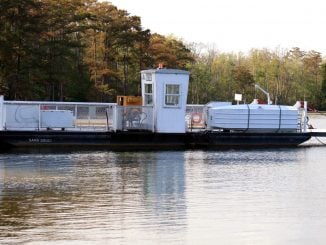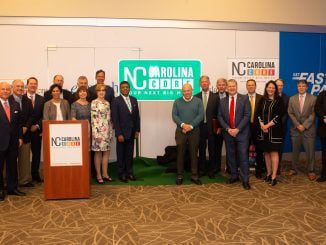NORTH CAROLINA — Hurricane Dorian debris removal and road repairs will further stress the cash-strapped N.C. Department of Transportation, which already has furloughed hundreds of personnel, and scrubbed work on hundreds of projects.
Making matters worse, State Board of Transportation Chairman Mike Fox told North State Journal, NCDOT could plunge deeper into financial jeopardy if the General Assembly overrides Gov. Roy Cooper’s state budget veto. That’s because the new spending plan places additional spending requirements on the state highway department.
Fox said NCDOT might have to go to the legislature for more funds, and floated the idea of creating a departmental reserve fund to alleviate future cash-flow predicaments.
He said the current dilemma was unavoidable due to court rulings and past weather events that put NCDOT in a $600 million hole.
Hurricane Matthew in 2016, Hurricane Florence and Tropical Storm Alberto in 2018, and mudslides in the state’s western regions required massive maintenance and recovery. Average cleanup costs jumped to $210 million a year the past three years. It averaged just $65 million annually from 2004 to 2015.
A state Supreme Court decision in 2016 said the state Map Act was unconstitutional, and the legislature repealed it, leaving NCDOT to pay damages. The agency had barred development on land designated for future highway corridors. The court ruled that was an unlawful taking of property because landowners weren’t compensated, and their property values dropped. The department paid $300 million to landowners last year, and the total could reach $1 billion.
By law NCDOT must maintain a cash balance equal to 7.5% of its budget, which would be $282.3 million, a legislative staff member said. If it drops below that level “they may not enter into any further transportation project contract commitments until the cash balance has been regained.”
During a Transportation Board meeting Thursday, NCDOT Chief Operating Officer Bobby Lewis said unofficial figures place the cash balance between $380 million and $400 million at the end of August, a razor-thin margin for an agency that spends several billion dollars annually. Spending will be “extremely tight” through at least December.
“We have taken a lot of painful action” to avoid going below the minimum cash balance, Lewis said. The department suspended employment of about 500 temporary and contract employees across multiple job classifications. Permanent hiring is continuing, but at reduced levels.
The department adjusted its spending plan to 10 percent below its base budget, which equates to more than $320 million below the conference budget.
NCDOT suspended preliminary engineering activities, and some right-of-way acquisition on roughly 900 projects statewide. Lewis hopes that will be no more than a three- to five-month pause.
“We’re focusing on targeting our resources towards activities that benefit the public the most in the short term,” Fox said during the meeting.
“The recent financial decisions do not affect the scheduled projects that are already currently underway, that have been awarded but not started construction, or are scheduled to start construction in the next 12 months,” Fox said.
Projects will go forward if they’re funded by N.C. Turnpike Authority bonds; state Build NC bonds for critical highway projects not covered by federal money; federal grants; or GARVEE bonds — financial instruments backed by anticipation of future federal receipts.
“We’re still looking at about $2.5 billion in projects to be let across the state this fiscal year,” Fox said.
After the meeting, Fox said decisions on what projects to curtail are based on the same data-driven formula used to create the State Transportation Improvement Program. Lower priority projects were the first to get pushed back.
“Everyone can rest assured there’s no favoritism, or one area’s going to get more than another,” Fox said.
Fox said the General Assembly and Cooper have been supportive, and could play a role in Hurricane Dorian recovery.
“If we had a $100 million storm bill and it looked like we were running off a cliff with our cash balance, that’s where we would have to go,” Fox said. “Potentially it can come out of the rainy day fund.”
Unlike other state agencies, DOT is not funded through the General Fund, Fox said. It is mainly funded from motor fuels tax, vehicle tax and registration fees.
“I think it’s premature to discuss any kind of DOT funding related to Hurricane Dorian as right now the focus should be on ensuring people who have been affected by the storm have basic needs like food, water and shelter. As far as ways to handle the DOT funding issues long term, Senate leadership is certainly willing to listen to any ideas that will prevent problems with DOT projects in the future,” said a spokesman for Senate leader Phil Berger, R-Rockingham.
At Cooper’s request, the General Assembly already passed Senate Bill 605 on a bipartisan vote earlier this year to provide NCDOT a $90 million loan from the General Fund’s unreserved fund balance. Other money was shifted to NCDOT from the Office of Recovery and Resiliency, which was set up to streamline natural disaster recovery efforts, along with an immediate repayment of funds for budgeted, time-sensitive economic development projects.
Fox said it hasn’t made sense for NCDOT to have its own reserve fund “because you want us to be spending our money on projects.”
“But that may be where we have to look at working with the legislature and the Governor’s Office on doing something like that so we don’t end up in a jam in the future,” Fox said.
Clouding NCDOT’s financial picture is the 2019-20 budget that directed the agency to spend more money on airports, coastal ports, and the North Carolina Railroad.
“It’s $100 million more going out without anything coming in to take its place,” Fox said. “We’re already in the hole, and it’s not time to dig deeper.” He hopes that new funding obligation could be addressed if the budget is revised.


